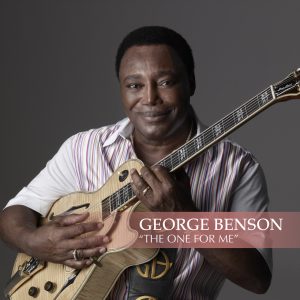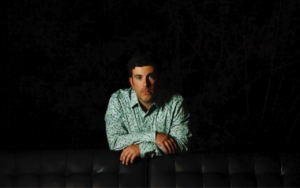George Benson has got it.
It?
Yeah, it!
What’s it?
It: guitar chops to-die-for, a soulful and versatile voice, 10 Grammy’s on the mantel (I’d assume), an international jazz following, an international pop following, a repertoire of classic songs; he’s an undeniable talent. I mean, the guy has two different giant-sized music careers!
And though he’s favored his jazz leanings for the better part of the last decade, Benson is back with a new pop record “The One for Me,” released by NewBorn Records and available now through CD Baby.
Radio promoter Tom Mazzetta sees this new release as the perfect opportunity for George to reconnect with his many pop fans who have “not necessarily gone away, but been dormant in some sense.”
The song, co-written by George and Dan Hill, is reminiscent of the romantic balladry heard in his classic hits “This Masquerade,” “In Your Eyes,” “The Greatest Love of All,” and “Nothing’s Gonna Change My Love For You.”
As producer Charles Wallert says, “George started out as a singer, and also emerged as one of the greatest guitar players of all time. His audience deserves both of his talents to be displayed to the max. I believe ‘The One For Me’ puts an exclamation point on the fact that George Benson is one of the greatest singers ever.”
It’s tough to pass up an opportunity to talk with a music legend, and one whose albums I played along to when first learning the guitar in high school — so I spoke with George Benson over the phone and asked him some questions about his long and accomplished career, the lessons learned along the way, and the music he’s making these days.
—————
An interview with George Benson
CR: You were exposed to a lot of different kinds of music at an early age. How did that broad listening experience inform the way you hear music today? What sorts of things are you listening for? What draws you into music?
GB: I think environent is everything — what you’re exposed to. I always use the term, “You can’t be great unless you know what greatness is.”
My first exposure to music was to people like Nat King Cole. My father was a Charlie Parker nut, and my stepfather who taught me to play guitar was a Charlie Christian nut, and my mother sang all the time — although she never did it professionally. My father played trombone, drums, and piano, but he never did it professionally. So through me, both my father’s and my mother’s dreams came true.
That early exposure they gave me, as well as growing up in Pittsburgh where they have so many jazz superstars — Art Blakey, the Turrentine brothers, Roy Eldridge, Ray Brown, Paul Chambers had studied music there — the exposure was incredible.
CR: And then you were playing ukelele at age nine, is that right?
GB: Seven years old. I was in nightclubs when I was seven, and I was on the street corners with my ukelele when I was seven. Making money playing music instead of selling papers. My friends were selling papers and I was out there with my ukelele, and people would put money in my cousin’s baseball cap. He’d pass the cap around.
CR: Sounds like a great first job.
GB: It was incredible. I can tell you that.
CR: So starting at such a young age to build up a repertoire of great tunes you could perform, I’m curious how that shaped your taste in terms of what you think makes a great song, and if that has remained consistent throughout your life — if you always look to the the same kinds of things in compositions?
Well the great thing about my coming up was that I was exposed to different kinds of music. I performed with Smokey Robinson’s band The Miracles. We were on the same show with him. I had my own singing group. So I know the Singing Group Era very, very well. The Doo-Wop Era — I know it very well. The top groups — I know what made ‘em great. I remember the great songs; they’re still in my mind. I still play them today.
Those things are what shaped who I am today. And it keeps me grounded. I’m always seeing what’s coming up through the roots, and if it goes out to a beautiful branch and turns into a flower, I know how it got there.
It really helps me to to keep ahold of things. I think that’s the reason why I’ve had such longevity in the music business. And all those singers are still my favorite singers: Smokey Robinson, Nat Cole, Sam Cooke, Jackie Wilson, all the oldies. Elvis, too. And the Beatles. I know The Beatles. The Rolling Stones. BB King. If you want to play some blues, you can’t get no better association than with the King of Blues himself. So even though I’m not a blues guy, I understand who the great ones are and why they are great. So that’s the good thing about my upbringing, my exposure.
CR: And I can hear all of those things seep into your performances. It’s a fusion of jazz and pop and standards and funk and all sorts of stuff.
I was curious if — and maybe this is something you were dealing with more in the 60’s and 70’s — but when you had the blossoming of a jazz career, playing with Miles Davis and Freddie Hubbard, and also this burgeoning pop career — if you ever felt pulled in two different directions to the point of frustration, and if you thought maybe it would’ve been easier or saner to just pick one course?
GB: John Hammond, the great A&R man, said it better than anybody. He said when he first met me, “George, I can see and I can hear that you can do a lot of things and you do them all well, but if you are known as a jazz artist first, you’ll have longevity.”
And he was right. If I had become a star when I was teenager — because everyone was telling me I was gonna be one — my career would’ve been already over. I would be working the Oldies circuit right now, at best. Because a lot of my heroes are on the Oldies circuit… Little Anthony and the Imperials, Jerry Butler, people like that. Jimmy Beaumont and the Skyliners. He was from Pittsburgh.
Right after he did his big hit — which I had actually recorded many years before that — right after that, the same people who produced his record hit on me to lead my singing group and they were gonna produce a record for me. That was my chance right there to become a singles star in the pop world. But by now that career would’ve been long gone. Nobody lasts forty or fifty years in the pop business. Not straight through. But in the jazz world — you can maintain a status in that world for the rest of your life.
CR: It’s great that you’ve been able to have that kind of balance, and draw your jazz audience into the pop music and bring your pop audience into the jazz world. It’s impressive.
GB: It sure is incredible. I couldn’t have figured it out myself. Other people helped make me who I am by telling me what it is they liked, and I tried to deliever. That’s what I’ve always been about.
CR: I heard you say that one thing that was really great about working with Quincy Jones was the process of finding the perfect songs for you as a performer. What was that process like?
Well, you know, I ended up working with producers who had great respect for songs. Tommy Lipuma was one. And it didn’t have to be a new song. Tommy when back and found “On Broadway” and “This Masquerade” (written by Leon Russell).
I said, “Man, who’s this, Leon Russell? Never heard of him!”
But Tommy made me know who he was. He sent me that song two or three different times, because I kept not responding to him. He said, “George, what do you think about that song?”
And I hadn’t listened to it yet. So he sent it to me again, and one more time. And what made me change my mind was my piano player at the time, Jorge Dalto — he’s long gone now — but he brought his wife to my new house which I’d just bought and she said, “Oh that’s my favorite song. That’s Leon Russell.”
I said, “How can this person know more about the music business than me? If this guy’s a star, how come I don’t know him? Maybe I better learn this, ya know?”
That was one case. And then Quincy Jones — of course when he gets his hands on something, when he hears a song, his thing isn’t “who’s singing this,” or “who’s playing that” — it’s “who wrote it?” That’s what he does. He went around looking for the great composers. And he hit it big time when he hooked up with Rod Temperton, because Rod was very flexible — and he could change songs around, take a hook somebody else had done and turn it into a brand new song, lean it in a pop direction which would get much more airplay because it was pop instead of R&B.
So those kinds of things made a difference, that I was fortunate enough to hook up with people like Quincy Jones and Tommy Lipuma.
CR: That’s always a skill I’ve been impressed with, the ability to hear greatness in a song even if the demo is a little lackluster or doesn’t have the slick production yet. Are you able to hear songs that way?
GB: Oh yeah, definitely. And even the great ones have a hard time with that one.
Celine Dion with the big song from Titanic — she was not impressed at first. So they finagled her into the studio, and she did a very off-the-cuff performance which turned out to be one of the most incredible pieces of music of our time. So you never know for sure.
But you know when you’re dealing with writers when they come up with songs like that, that just smack you in the face on Day 1 — You say wow. And the performance really counts, too. A voice like Celine, all she needed was something great to sing, because everything she touched was magnificent.
So all of it counts. So what I do, I listen to everything… all the different kinds of music; I listen for the hooks and things, and what is gonna change the music industry. I can tell by the performance, like when you first heard Prince, you knew music wan’t gonna be the same anymore. He was gonna do something to music. We didn’t know what it was — but it was gonna change. And the same with people like James Brown, Marvin Gaye, Sinatra, Nat King Cole. They’re not ordinary people. They’re game-changers.
CR: In the early stages of your career, you must’ve had some discouraging moments; I’m wondering how you overcame them or sidestepped them?
GB: Well, by me being known first on the internationl scale as a guitar player.
I wasn’t know that way in my own town. As a kid I was Little Georgy Benson, the singer. And that’s the guy they were betting on — betting that my voice would take me to the top.
But when I went on the road (with Jack McDuff), no one knew I sang. And Jack didn’t like singers. He said they took too much credit away from the band. You could have a mediocre singer and the greatest band in the world and people would give the singer more credit, because they just like singing. It’s easier for them to digest.
Jack didn’t want any singing in his bands, so for 2.5 years I learned to play guitar. And I became known as a guitar player, and then when I started putting out vocals, nobody wanted to hear it — for two reasons. One was: they only knew George Benson the guitar player and they didn’t need another singer. The other one was they didn’t think my voice was good enough, because I wasn’t a soul singer. I can sing those songs but I don’t prefer them. I’d rather sing pop songs, ya know. Songs that last forever. Ballads. And the world was into really soulful things, Motown, and the stuff coming out of the south, but those are short-lived songs as far as I’m concerned. I’m looking for Nat Cole songs, “Mona Lisa,” “Nature Boy,” that stuff that lasts forever. My ears are already tuned to that. And that’s what Charlie Wallert did, he saw me as that kind of singer.
CR: You’re working with Charlie to put out your new single “The One for Me,” and also I heard rumors of a Nat King Cole cover album — so what are you working on now? What’s happening now in your musical life? What’s your next year look like?
That’s it. That’s the one. The Nat Cole record that we’re putting out. It’s coming along fantastic, even better than we imagined.
Hopefully it’ll remind people about the greatness of Nat Cole, and it’ll put us in a different light. Because people know I’m flexible, but they wanna know where you’re going next. They like to get a leg up. And when they think about that, when you mention it to people they’ll say, “Hmm, wait a minute now — George Benson singing Nat Cole? I can’t imagine that.”
So they have to hear it! In order for them to make a judgement on it.
So the record better be good, is all I’m saying, because we’re talking about the top of the top, he’s the top man as far as African American singers are concerned.
CR: He sets a high bar, but I’m sure you’ll meet it or better. Thanks so much for taking the time to talk with me.
——————
For more information on George Benson, check out his official website HERE.
Purchase George’s new single “The One for Me” at cdbaby.com.
See the video for the new single below:


